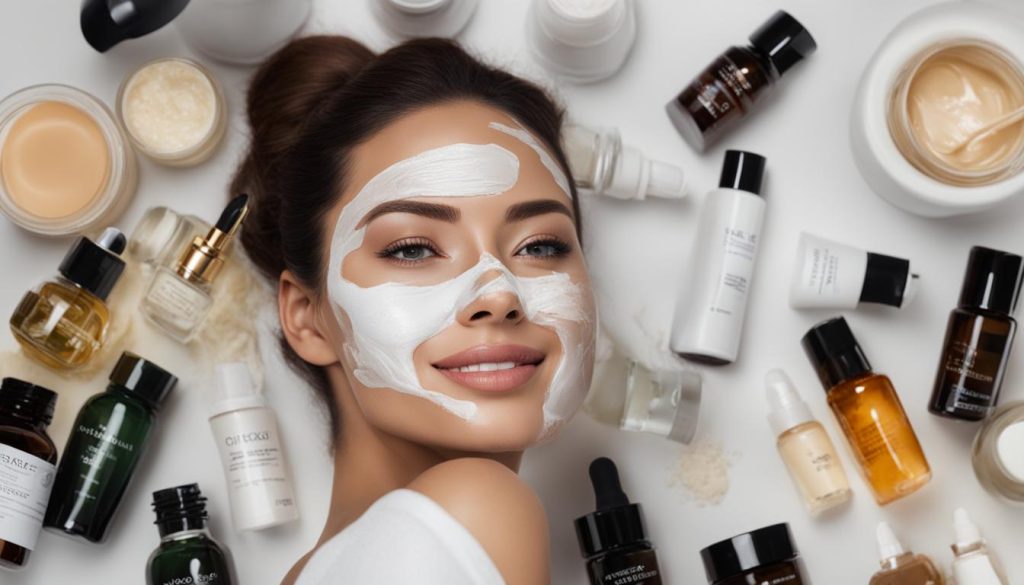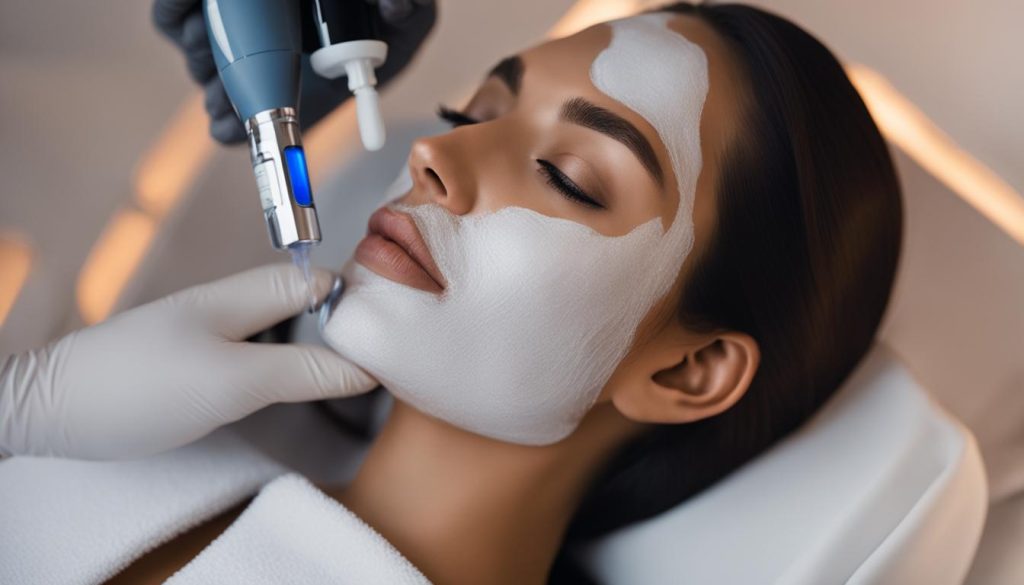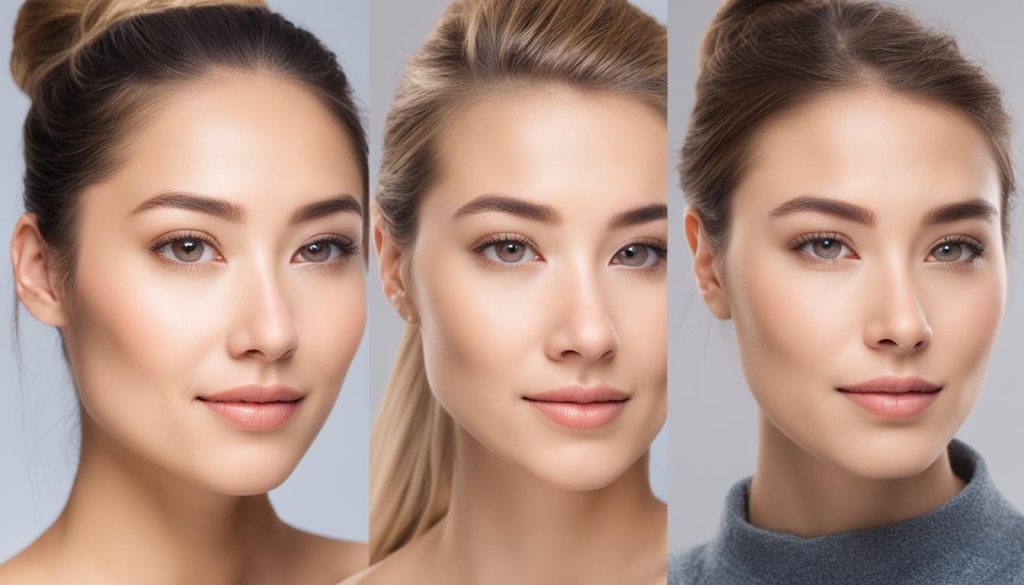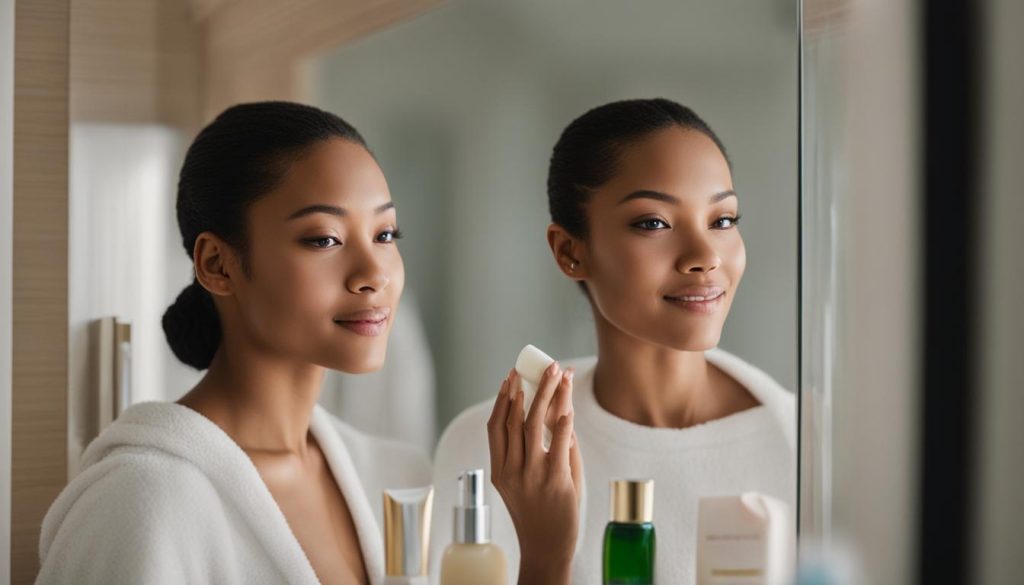As someone deeply invested in my skin’s health, I’m all too familiar with the challenges of battling hyperpigmentation. I understand the frustration that comes with trying to achieve that elusive, even skin tone. Over the years, I’ve learned that the key to diminishing the appearance of stubborn dark spots, especially for those of us dealing with oily skin, is implementing the best skin care routine for dark spots—a carefully tailored regimen that addresses the unique needs of our complexions.
Whether you’re looking to clear dark spots caused by overexposure to the sun, or you’re in search of uneven skin tone remedies, I’ll guide you through a dark spot skincare routine that can help. With the right approach, not only can you reclaim the natural radiance of your skin, but you can also protect it from future damage. And remember, while instant results are rare, consistency is the secret weapon in any skin care routine for dark spots.
Best Skin Care Routine For Dark Spots
- A stringent, daily skincare regimen is vital for managing hyperpigmentation.
- Combating dark spots on oily skin requires unique treatment tailored to reduce excess oil while fading discoloration.
- Incorporation of both preventative and corrective products will optimize the dark spot skincare routine.
- The journey to clear dark spots includes a mix of over-the-counter products and possibly professional treatments.
- Patience and perseverance are essential—achieving an even skin tone won’t happen overnight, but with the right methods, progress will follow.
Understanding Dark Spots and Their Causes
Embarking on the journey to a clear complexion often begins with understanding the common but troublesome issue of dark spots on the skin. As I delve into the details of hyperpigmentation, it’s crucial to highlight the leading skincare solutions and the importance of tailoring a regimen specifically to fade dark spots and combat skin discoloration. So, let me share my insights on why these patches appear and how a dedicated skincare routine for hyperpigmentation can offer significant remedies.
Definition and Types of Dark Spots
The landscape of hyperpigmentation is vast, with various types of dark spots each having its peculiarities. Freckles, melasma, acne scars, and sun spots, officially known as solar lentigines, are all manifestations of this condition. These pesky pigmented areas stem from an overproduction of melanin, the natural pigment that gives our skin its color. To target these effectively, my recommended hyperpigmentation remedies prioritize products and practices crafted to address the complexities of these discolorations.
The Role of UV Exposure and Skin Damage in Hyperpigmentation
The sun plays a meaningful yet double-edged role in our lives. Notorious for its contribution to dark spots, UV exposure accelerates melanin production as a natural defense against skin damage. This can result in the uneven pigmentation seen in sun-damaged areas. Hence, my quest for the best skincare routine for hyperpigmentation does not merely address the existing damage but emphasizes prevention, particularly with high-SPF sunscreens that minimize future risk and help fade dark spots already formed.
Contributing Factors: Hormones and Inflammation
Aside from sun exposure, hormonal fluctuations and inflammation are pivotal in the development of hyperpigmentation. Breakouts, aggressive skincare treatments, as well as hormonal changes observed during pregnancy, menopause, or as a side effect of contraceptive use, all contribute to skin discoloration. Integrating anti-inflammatory ingredients and stabilizing compounds into my skincare routine for hyperpigmentation helps address these internal factors, aiming to restore my skin to its natural, even-toned state.
- To alleviate inflammation-triggered hyperpigmentation, I routinely select products with niacinamide and aloe vera.
- For hormone-induced discoloration, ingredients like soy and licorice extract have proven beneficial in my experience.
Understanding the intricacies behind dark spots is instrumental to successfully diminishing their appearance. With consistent use of targeted hyperpigmentation skincare, including both preventative measures and corrective treatments, the path to improved skin clarity looks promising.
Creating a Foundation: Cleansing and Preparing Your Skin
Embarking on a skin care routine for acne and dark spots begins with a vital foundational step: cleansing. As I delve into my regimen, I recognize the irreplaceable role that a clean slate plays in combating skin imperfections. Through daily cleansing with high-quality products such as the Dr. Dennis Gross Alpha Beta AHA/BHA Daily Cleansing Gel, I ensure that all traces of the day’s buildup are thoroughly removed. This cleanser not only eradicates dirt and excess oil, but also gently exfoliates the skin, contributing to a more radiant and even skin tone.
Preparing my skin for the treatment phase is paramount, and here’s how I establish the groundwork for an effective dark spot treatment:
- Begin with lukewarm water to wet the face, providing a gentle environment for the cleansing gel.
- Dispense a small amount of the Dr. Dennis Gross cleanser onto my fingertips.
- Apply in circular motions, focusing on areas prone to acne and dark spots.
- Rinse thoroughly, ensuring no residue is left behind.
- Pat my skin dry with a soft towel, avoiding harsh rubbing.
This process primes my skin effectively, ensuring that subsequent dark spot corrector products and treatments penetrate deeply and work optimally. With a properly cleansed face, I am confident that my efforts in using a dark spot remover and maintaining skincare for an even skin tone are not in vain, setting the stage for a visible transformation.
Best Skin Care Routine for Dark Spots
My ongoing battle against dark spots and hyperpigmentation has led me down a path filled with various skincare routines. However, I’ve discovered that the most effective method involves a combination approach that not only addresses the existing discoloration but also prevents future spots from surfacing.
Consistency is the cornerstone of my regimen. It’s crucial to integrate specific products that target the multitude of factors contributing to dark spots. Here’s how I weave these powerful elements into my daily skincare routine:
- Chemical Exfoliation: I trust in the transformative power of the Dr. Dennis Gross Alpha Beta Extra Strength Daily Peel to gently dissolve dead skin cells accumulating on the surface, brightening my dark spots gradually over time.
- Incorporate Vitamin C: Each morning, a potent vitamin C serum kisses my skin. Its antioxidant properties are not just for the sake of brightening dark spots, but also for providing a shield against environmental aggressors.
- Evening Retinol Application: Come nightfall, retinol serums help accelerate cell turnover and break the cycle of pigment production, enabling newer, less pigmented cells to surface.
- Hydrate Intelligently: To seal in the benefits of these powerful actives, I opt for a vitamin C-infused cream for additional brightening or an oil-free moisturizer catering to my skin’s hydration needs without clogging pores.
Furthermore, I delve into natural remedies for dark spots, embracing ingredients like licorice extract and niacinamide for their inherent ability to even out skin tone. And let’s not forget about the innovative use of red light-emitting diodes (LEDs) to enhance skin’s healing and reduce inflammation—my own secret weapon in the quest to brighten dark spots.
Through trial and error, I’ve uncovered that the best skin care for wrinkles and dark spots is a blend of these scientifically backed tactics coupled with nature’s healing touch. Incorporating this routine diligently, you too can witness a visible reduction in hyperpigmentation and a gradual unveiling of brighter, more even-toned skin.
Remember, while an expertly curated skincare routine can create significant change, it’s the amalgamation of these skincare tips for dark spots, lifestyle adjustments, and a touch of patience that ultimately reveals the radiant skin beneath.
Targeted Treatments: Fading Discoloration Effectively
As I journey deeper into the realm of skincare for hyperpigmentation, I’ve realized the significant impact of targeted treatments. Not all ingredients are created equal when it comes to the mission to fade dark spots. Through both personal experience and professional guidance, I’ve learned the various benefits of hyperpigmentation remedies in skincare.
The Power of Active Ingredients: Vitamin C, Retinol, and More
My daily regimen includes several key players known for their prowess in combating skin discoloration. Hydroquinone, for instance, plays a pivotal role in dark spot treatment by inhibiting melanin synthesis. Meanwhile, the antioxidant properties of Vitamin C not only protect against environmental aggressors but also enhance skin radiance. Retinol, another staple in my hyperpigmentation skincare routine, accelerates cell turnover, helping to slough off darkened cells and unveil a brighter complexion.
In addition to these, I incorporate ingredients like azelaic acid—which targets hyperpigmentation with its anti-inflammatory effects—as well as kojic acid and niacinamide. Both widely recognized for their ability to even out skin tone, these active components are a must in my arsenal against dark spots. Let’s explore how these powerful ingredients can be integrated responsibly into a skincare routine:
- Having patience with Vitamin C: Starting with a lower concentration ensures my skin can adapt without irritation.
- Dosing Retinol right: I use retinol sparingly to begin with, slowly increasing frequency to allow my skin to adjust.
- Mixing up my actives: Alternating these powerful ingredients prevents overwhelming my skin and maximizes their benefits.
Choosing Between Over-the-Counter Products and Prescriptions
It’s not always easy to decide between over-the-counter options and heading to the dermatologist for prescription-strength solutions for more severe skin discoloration remedies. In milder cases, over-the-counter dark spot correctors sufficed to improve my complexion. However, for those tenacious areas refusing to fade, prescription treatments beckon. These potent formulas, containing higher percentages of active ingredients, tackle deeper or more stubborn hyperpigmentation but come with an advisory: use them under professional supervision to avoid aggravating the skin, which could counteract the fading process.
When it comes to managing these conditions, I don’t hesitate to consult my dermatologist to monitor progress and adjust treatments as needed. Incorporating these medications into my routine has harmonized with my skin’s natural rhythm, weaving in efficacy with safety. Remember, when dealing with prescription treatments:
- Seek professional advice to ensure they’re right for my specific skin type and concerns.
- Start slowly to monitor how my skin reacts.
- Always accompany treatments with sun protection to safeguard my progress.
With a consistent approach and an understanding of how to harness the power of these hyperpigmentation remedies, I’ve seen a noticeable change in my skin’s appearance—dark spots are visibly diminished, and my skin tone has become more even and luminous.

Hydration and Protection: Moisturizing and Sunscreen Use
As someone deeply immersed in the best skin care routine for acne and dark spots, I understand the critical role moisture and protection play. Intense research and personal experimentation have led me to adopt a skincare routine for dark spots and hyperpigmentation that hinges on both hydration and vigilance against the sun’s harmful rays.
- A core component of my daily regimen is the application of Dr. Dennis Gross Vitamin C Lactic Dewy Deep Cream. This potent moisturizer delivers not only necessary hydration but also a brightening punch thanks to its Vitamin C content, making it a natural remedy for dark spots.
- On days when my skin feels exceptionally thirsty, I switch to an oil-free moisturizer, as a means to nurture my skin without adding excessive oiliness, which is crucial for maintaining the balance and offering uneven skin tone remedies.
- But hydration would be futile without protection. Each morning, without fail, I slather on a broad-spectrum SPF 30 sunscreen. It has become as second nature as drinking coffee. It’s more than preventing sunburn; it’s an active measure in my dark spot treatment arsenal.
- Recently, I’ve been favoring 100% mineral sunscreen formulations that feature ingredients like tranexamic acid, which boasts the added benefit of actively reducing hyperpigmentation and melasma. It’s as though these sunscreens were tailored for those of us battling with dark spots and seeking natural remedies for dark spots.
The journey to achieving a radiant complexion isn’t complete without considering these pillars of hydration and protection. In my experience, when these elements are in sync, they lay a resilient foundation for any skincare routine aimed at combating dark spots and hyperpigmentation. This balance is not just a component of my routine; it has become the benchmark for my self-care practice.
Advanced Skin Care: Professional Treatments for Dark Spots
When I consider intensifying my fight against hyperpigmentation, I look beyond the confines of my bathroom cabinet. The truth is, even the best skin care for wrinkles and dark spots can sometimes require a stronger, more targeted approach. For those tenacious or pronounced dark spots, it’s reassuring to know that professional treatments are available, designed to brighten dark spots and even out skin tone effectively.

In-Office Procedures: Peels, Lasers, and Beyond
Professional treatments, such as chemical peels and laser therapies, are executed by certified dermatologists and offer precise, potent solutions for stubborn dark spots. These in-office procedures target the deeper layers of the skin, where melanin accumulates, helping to diminish the appearance of dark spots. Laser treatments in particular, with their ability to target and break down pigmentation, are considered some of the most efficient dark spot correctors available to us.
At-Home LED Treatments and Their Benefits
But what about the days between office visits? There are at-home devices like the Dr. Dennis Gross DRx SpectraLite FaceWare Pro, bringing the power of LEDs directly to our skincare routine. This device harnesses the benefits of red LEDs to foster cellular repair and combat inflammation, which is essential since inflammation can lead to further hyperpigmentation. In fact, such at-home LED treatments are increasingly recognized as reliable natural remedies for dark spots, acting as both a dark spot remover and a proactive measure in a comprehensive skincare regimen.
Conclusion
In my journey to demystify the path to luminous skin, I’ve learned that the journey to diminish dark spots requires a diligent strategy and the best skin care routine for dark spots. Daily cleansing is the springboard that sets the foundation for effective dark spot treatment, paving the way for the unparalleled impact of targeted ingredients. My skin, once marred by uneven patches, now benefits from a carefully curated skincare routine dark spots that includes potent serums and creams designed to lighten and even out skin tone.
Hydration and sun protection form the dual pillars of prevention in the best skincare routine for hyperpigmentation. By fortifying my skin with moisture and shielding it from the sun’s rays, I’ve noticed a significant decline in the appearance of these age-revealing blemishes. Moreover, I found that consistency is key; persistently following skincare tips for dark spots, and integrating both over-the-counter remedies and expert-prescribed treatments, leads to a noticeable fading of hyperpigmentation. The inclusion of medical-grade products and treatments has catapulted my results, offering a promising outlook on attaining a clear, radiant complexion.
Ultimately, understanding the underlying causes of dark spots strengthens my resolve in addressing them effectively. By recognizing the factors that contribute to these blemishes, such as UV exposure and hormonal influences, I equip myself with the knowledge to choose the most appropriate solutions. The shift toward an informed, targeted approach in handling dark spots not only enhances my skin’s appearance but bolsters my confidence as I navigate the world with rejuvenated skin that tells a story of triumph over imperfection.
FAQ
What is the best skin care routine for dark spots?
An effective skincare routine for dark spots should include cleansing with a product like Dr. Dennis Gross Alpha Beta AHA/BHA Daily Cleansing Gel, followed by exfoliation, targeting hyperpigmentation with active ingredients such as vitamin C and retinol, and moisturizing with an appropriate cream or lotion. Consistent use of broad-spectrum sunscreen is also crucial for preventing further dark spots.
Can oily skin contribute to dark spots?
Oily skin does not directly contribute to dark spots but can make them more noticeable. Moreover, acne often associated with oily skin can lead to post-inflammatory hyperpigmentation when not managed properly. Hence, controlling excess oil and treating acne effectively is important to reduce the risk of dark spots.
How can I clear dark spots from my face?
To clear dark spots, incorporate products containing hydroquinone, vitamin C, retinol, azelaic acid, kojic acid, or niacinamide into your daily skincare routine. These ingredients help fade hyperpigmentation by inhibiting melanin production and promoting cell renewal. For more persistent dark spots, consult with a dermatologist to explore prescription options or professional treatments.
Are there natural remedies for dark spots?
Yes, there are natural remedies that can help brighten dark spots, such as the application of lemon juice, aloe vera, licorice extract, and certain essential oils. However, these remedies might be less potent compared to clinical treatments and should be used with caution, as they can cause skin sensitivity, especially to sunlight.
What causes dark spots and hyperpigmentation?
Dark spots and hyperpigmentation are primarily caused by excessive melanin production in the skin, which can result from UV exposure, hormonal changes, skin injury, and inflammatory processes. It’s essential to understand what causes hyperpigmentation in your particular case to choose the most effective treatment.
What ingredients should I look for in products to fade dark spots?
Look for products containing active ingredients such as hydroquinone, vitamin C, retinol, azelaic acid, kojic acid, and niacinamide. These ingredients help fade dark spots by inhibiting pigment production, exfoliating the skin, and brightening the overall complexion.
How does sunscreen help prevent dark spots?
Sunscreen helps prevent dark spots by protecting the skin from UV radiation, which can trigger hyperpigmentation. A broad-spectrum sunscreen with at least an SPF of 30 should be applied daily, even on cloudy days or when indoors, to protect your skin and prevent the formation of new dark spots.
What professional treatments are effective for reducing dark spots?
Professional treatments such as chemical peels, laser therapy, intense pulsed light (IPL), microneedling and prescription-strength topicals can be more effective at reducing stubborn dark spots and hyperpigmentation. These treatments should be administered by a certified dermatologist or skincare professional.
Can LED treatments help with dark spots?
LED treatments, particularly those using red light, can help reduce dark spots by promoting skin repair and reducing inflammation. Devices such as the Dr. Dennis Gross DRx SpectraLite FaceWare Pro offer at-home options for LED therapy, complementing daily skincare routines and professional treatments.






